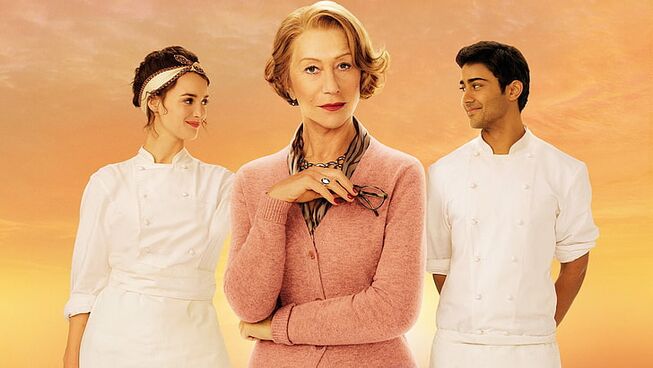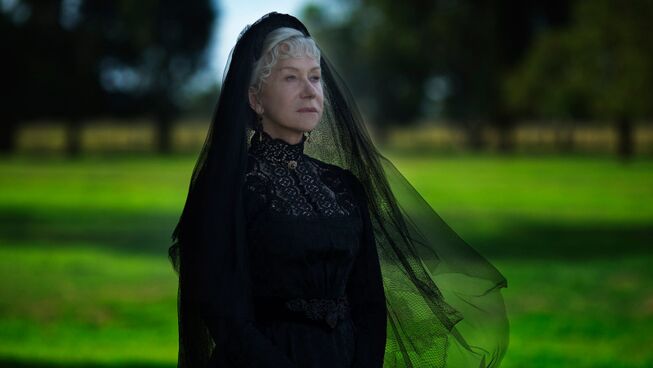
3 out of 5 stars
The lead character in this film has to be international cuisine. What is seen on the screen leaves you with no need for overt sensual visuals, only the beauty and desire that can only come through the seduction of food. The Hundred Foot Journey shows that food is the means of understanding and experiencing the heart and soul of every culture. The journey begins with the introduction of the Kadam family in the markets of India and their family restaurant. It is here that Hassan (Manish Dayal) experiences and grows in his knowledge of the culinary arts and of life outside of the kitchen. It is even in the kitchen of the family restaurant that tragedy strikes and the family leaves India for Europe.
Eventually they find themselves in a small village in France and the family patriarch, Papa (Om Puri), determines that this will be where they start afresh and introduces the beauty of Indian fare to the local community. The location of choice causes warfare to ensue within the community and with the local restaurateur, Madame Mallory (Helen Mirren). As the story unfolds, the spices of the cultures begin to mix in the air and in the community, the barriers begin to fall between the people and the restaurant owners. Merely by entering into the Hassan's kitchen, Madame Mallory is introduced to his talents and the two begin a journey to culinary excellence. This journey brings together these cultures and the community benefits from the experience.
Lasse Hallström (Cider House Rules, Chocolat) is no stranger to directing films that capitalise on the senses of the kitchen, even when we are left with the limitations of only seeing the food. As with Chocolat, he manages to convey the story through the food and the beautiful backdrop of the French landscape. Yet, the strength and weakness of the film can be found in the story. The story is a journey for the central characters to be experience and respond to to change and the crossing of cultural barriers, prejudices and tradition. The battle between restaurant owners and the tension between the small community and the strange new family lay the culinary canvas for the eventual realisation of Hassan's gifts. Mirren elegantly conveys the role of a business owner who has a steely exterior that covers a warm heart.
Om Puri conveys the essence of the Indian traditions and family values that add spice to the community and draws people to him and to his restaurant. He would be known to Indian cinematic fans, but for western cinema goers, he should be a welcomed introduction. Also, the breakout roles for Manish Dayal (Hassan) and Charlotte Le Bon (Marguerite) were well cast as the conveyance of innocence and passion in the kitchen. Their chemistry is the perfect mixture of forbidden love for the film. Their acting prowess is encapsulated in the picnic scene and can be considered a cinematic gem. It is an example of sensual beauty through the experience of food. It is an innocent seduction of the senses that may cause you to look away, even through no clothes are shed or barely any words were spoken. The same can be said of the omelette scene between Mirren and Dayal, which conveyed the true blending together of relationships and cultures. These scenes show the beauty of the film by Hallström and his ability for cinematic brilliance.
The difficulty with the story of The Hundred Foot Journey is the challenge of most films that are interpreted from a good book. There is too much story for this film. The richness of the story is marred by the necessary brevity of film. The Cinderella story of Hassan going from the streets of India to the art-house cuisine of Paris happens too fast, it is hard to imagine it could actually occur. This takes away some of the impact of the later scenes, because the characters have not been able to fully develop. This could be attributed to the addition of all of the other love interests and cultural underpinnings that eventually overwhelm the senses. Not to spoil one of the key twists in the film, but the chemistry between Mirren and Puri is not a receipe for cinematic romance. As adversaries they are believable, but as a romantic connection it leaves a bad aftertaste. But, even with these short comings, this an enjoyable film and would be a safe bet for a wonderful date night. The Hundred Foot Journey is like most French cuisine, romantic, sensual, but subtle in it's delivery.
Leaving the cinema...
Culinary films seem to the the flavour of cinema lately, but this was a delicious experience. Not without its shortcomings, this film was not high end cuisine but should be considered to be the equivalent of comfort food. You cannot go wrong with this film as an enjoyable time at the cinema. If you are with the one you love, you will leave the theatre smiling and satisfied.
Reel Dialogue: What are some of the bigger questions to consider from this film?
1. Can we or should we speak with the dead? (1 Samuel 28:1-25; 1 Chronicles 10:13-14)
2. Who is God? (Exodus 34:5-7, Matthew 22:32)
3. The value of telling a story through food (John 6:35, 1 Corinthians 11)
4. What happens if you gain the whole 'world?' (Matthew 16:25-27)







